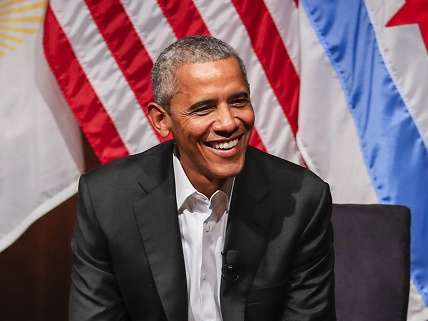Actually, It's Totally Fine That Obama Is Being Paid $400,000 to Give a 'Wall Street Speech'
You don't have to restrict the actions of former government officials to reduce corruption, you have to restrict the actions of government.

Since word got out that former President Barack Obama would be paid $400,000 to speak at a healthcare conference sponsored by Cantor Fitzgerald, a Wall Street investment firm, the condemnation from liberal commentators has been almost unanimous. But there's actually nothing wrong with Obama giving the speech—and the controversy over it illustrates the silly nature of Democrats' (and increasingly Republicans) anti-Wall Street rhetoric and bromides about making "too much money," and their fundamental misunderstanding of why voters just weren't that into Hillary Clinton.
Many of the arguments against Obama's $400,000 speech go like this: it'll "undermine everything he believes in," Matthew Yglesias wrote at Vox.com. According to Yglesias, the former president should have rejected the speaking opportunity because progressives' "Achilles heel" was the perception of corruption. Yglesias also argued ethical rules would never be enough to "prevent the government from being suborned by special interest" and dispel the idea of the private-public sector revolving door.
The opposition to Obama's speech among the Democratic base is fueled by two sentiments propagated by Democrats for years—that there was something wrong with Wall Street (a metonym for the finance industry) as a whole, and that there was such a thing as making enough money.
Bernie Sanders' insurgent campaign and persistent popularity was built on these ideas. Sanders often railed about Wall Street (but rarely about the Federal Reserve or how regulatory capture distorts industries) as well as billionaires and the "1 percent" as a class (n.b., an income of less than $500,000 a year puts an individual in the top 1 percent of income earners, so Sanders' "moral and political war on billionaires" is far broader than he often lets on). Despite trafficking in thoroughly debunked economic nonsense, Sanders' rhetoric was popular.
Obama's Wall Street challenges both those notions—that Wall Street as a concept is a problem and that someone other than the worker can say when he or she's had enough money. Obama is drawing a $400,000 a year pension and signed a $12 million book deal. It's no one's right to tell him when he's made enough money except him or his family.
Sanders has been particularly good at inoculating himself from the dissonance between his rhetoric and his actions. "How many yachts do billionaires need?" Sanders tweeted last week. "How many cars do they need? Give us a break. You can't have it all."
Of course, in America you can have it all. Or at least you can try. Sanders has never really had a career outside of government and is on his third home. No one can determine how many homes Sanders "needs" but him—his government job is fair play. Millions of voters rejected Clinton returning to government service after appearing to "cash out" on it. In a democratic system, popular outrage can be the ultimate ethical rule. Political parties look to separate the distrust of government that might exist among thier supporters from those government officials on "their side." Many voters happily oblige.
Yet it doesn't matter which particular creature is living in the swamp so long as the swamp is there. Government attracts corruption because government accumulates power. The most effective cure for corruption is limiting the power government has over the affairs of free people. Donald Trump played on this during the campaign—pointing out in the Republican primary that he was the only one to have ever bought a politician so he knows what to do about it. The claim is belied by his expansive view of government powers.
Such power invites corruption. Limited government is not an end in to itself. The constitution limits government power in order to limit government abuse; the two can not be disentangled, irrespective of anyone's personal feelings about this swamp creature or that.
Obama's $400,000 speech has little to do with the swamp. Insofar as the companies and groups that will be paying Obama to speak do so in the hopes of gaining influence on the bureaucratic machinations of federal regulators, the problem lies with the rapid growth of the kinds of regulations and bureaucracies wide open to corruption.
The increasingly bipartisan populist rhetoric against Wall Street and corporations in general helps deflect attention from the role of government power in creating the problems in the first place while ensuring that nothing is done to change it.


Show Comments (101)